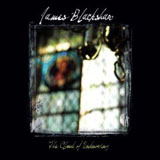Home » Jazz Articles » Album Review » James Blackshaw: The Cloud Of Unknowing
James Blackshaw: The Cloud Of Unknowing
British 12-string acoustic guitarist James Blackshaw's roots lie in the Takoma school of American primitivism led by guitarist John Fahey—in the "cosmic sentimentalism" which Fahey turned against in his final years. Other major influences include South Asian folk music, European court music of the baroque era, and modern minimalism—not the taut, cerebral minimalism of early Steve Reich or Terry Riley, but the "mystic minimalism" of Arvo Part or Reich's "Electric Counterpoint" (written for Pat Metheny in 1987).
But while it may not be jazz as defined by the jazz police, The Cloud Of Unknowing sits comfortably alongside the astral jazz of pianist/harpist Alice Coltrane or saxophonist Pharoah Sanders—raga-like in its scalar structure, touched by different cultures, unhurried in its exposition, and always soaringly lyrical. Anyone still out there with Sanders' Tauhid (Impulse, 1967) or Coltrane's Universal Consciousness (Impulse, 1971) is going to love it.
Blackshaw's style—which is self-taught yet virtuosic—is rococo and exuberant and recorded up-close, as it is here, to catch all the treble-end harmonics and bass drones, he at times suggests a harp or sitar player, albeit one with four hands. His finger picking is phenomenally agile, allowing him simultaneously to play rippling, mandolin-like melodies on the top strings, rapid-picked argeggios and counterpoints in the mid range, and deep bass ostinatos down below.
He's a one-man, 12-string symphony orchestra. He favors waltz-time, played with a pronounced accent on the downbeat, rocking back and forth, one-two-three, one-two-three, between complementary chord centers every two, four or eight bars. Combine all this with river-like melodic flow and you have music of rare power. It's blissful, without being blissed out, joyous and uplifting.
Just occasionally, as on the brief middle piece, "Clouds Collapse," in which Blackshaw makes his guitar sound like a koto (I hear, or imagine, the astringent contemporary Japanese composer Jo Kondo), or on the closing five minutes of "Stained Glass Windows," where Fran Bury's electronically treated violin sounds like the harbinger of the apocalypse, the music strikes a harsher note—as though to remind us that nirvana doesn't come without struggle. But the abiding mood is one of hope and beauty. A jewel of an album.
Track Listing
The Cloud Of Unknowing; Running To The Ghost; Clouds Collapse; The Mirror Speaks; Stained Glass Windows.
Personnel
James Blackshaw
guitarJames Blackshaw: 12-string acoustic guitar, glockenspiel (2); Fran Bury: violin (2, 5); Hamza El Din: oud (4).
Album information
Title: The Cloud Of Unknowing | Year Released: 2007 | Record Label: Tompkins Square
< Previous
July 2007: Teacher Finder, Musician F...
Next >
Avishai Cohen: As Is
Comments
Tags
For the Love of Jazz
 All About Jazz has been a pillar of jazz since 1995, championing it as an art form and, more importantly, supporting the musicians who create it. Our enduring commitment has made "AAJ" one of the most culturally important websites of its kind, read by hundreds of thousands of fans, musicians and industry figures every month.
All About Jazz has been a pillar of jazz since 1995, championing it as an art form and, more importantly, supporting the musicians who create it. Our enduring commitment has made "AAJ" one of the most culturally important websites of its kind, read by hundreds of thousands of fans, musicians and industry figures every month.




















